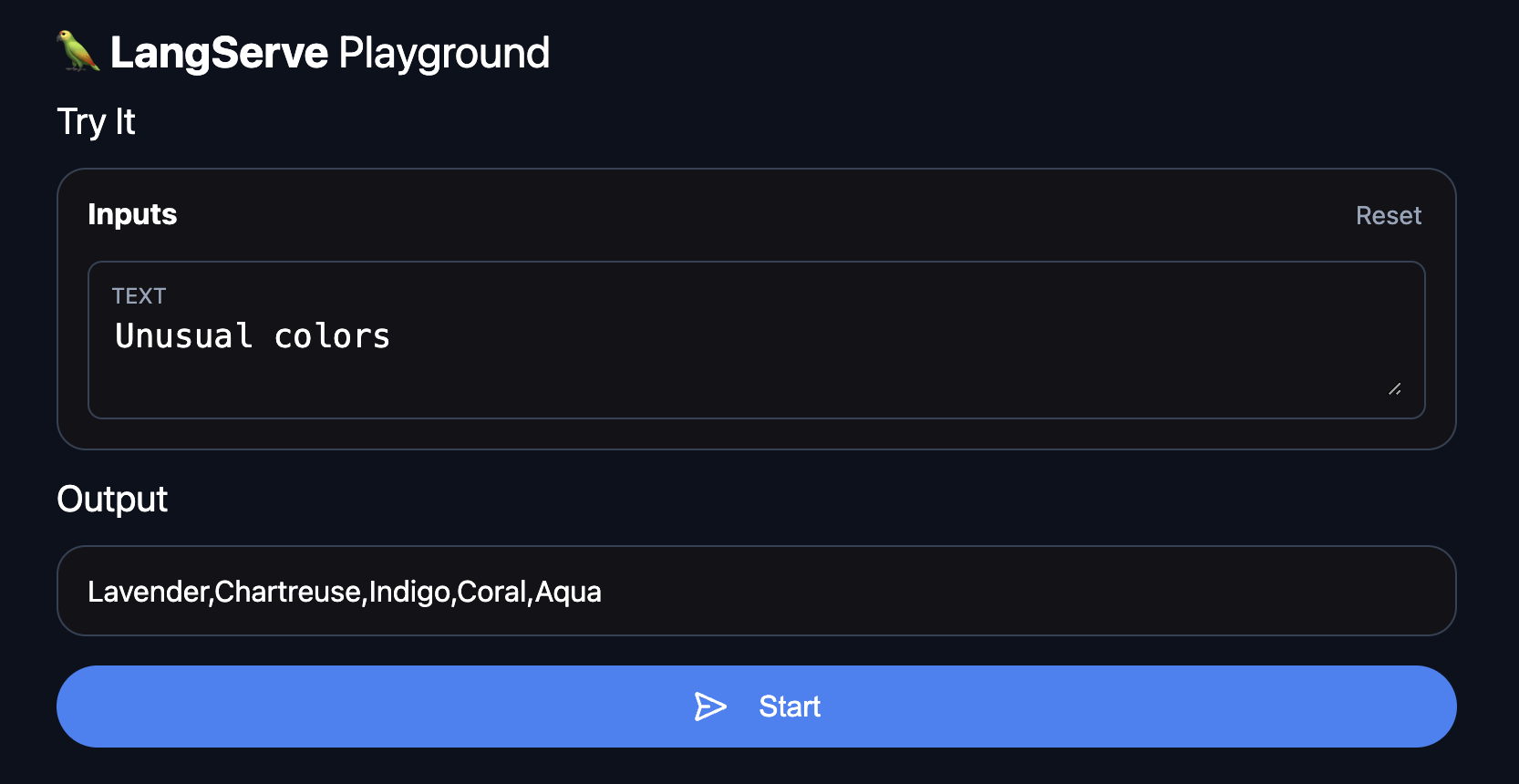This unofficial LangChain server based on Langserve is a work in progress. It is not yet ready for production use. Not all features are implemented
Overview
LangServe helps developers deploy LangChain runnables and chains as a REST API.
This library used express as a peer dependency to provide a server.
In addition, it provides a client that can be used to call into runnables deployed on a server. A javascript client is available in LangChainJS.
Features
object, and enforced on every API call, with rich error messages
/invoke/endpoint with support for many concurrent requests on a single server- Playground page at
/playground/with streaming output and intermediate steps - All built with battle-tested open-source JavaScript libraries like Express.
- Use the client SDK to call a LangServe server as if it was a Runnable running locally (or call the HTTP API directly)
- LangServe Hub
Limitations
- Client callbacks are not yet supported for events that originate on the server
Security
Installation
npm install langserveExamples
Get your LangServe instance started quickly with LangChain Templates.
For more examples, see the templates index or the examples directory.
Server
Here's a server that deploys an OpenAI chat model, an Anthropic chat model, and a chain that uses the Anthropic model to tell a joke about a topic.
import express from "express";
import { ChatPromptTemplate } from "langchain/prompts";
import { ChatAnthropic } from "langchain/chat_models/anthropic";
import { ChatOpenAI } from "langchain/chat_models/openai";
import { add_express_routes as add_routes } from "langserve";
const app = express();
add_routes(app, ChatOpenAI(), { path = "/openai" });
add_routes(app, ChatAnthropic(), { path: "/anthropic" });
const model = ChatAnthropic();
const prompt = ChatPromptTemplate.from_template("tell me a joke about {topic}");
add_routes(app, prompt.pipe(model), { path: "/joke" });
app.listen(8000);Client
Javascript SDK
import { SystemMessage, HumanMessage } from "langchain/schema";
import { ChatPromptTemplate } from "langchain/prompts";
import { RunnableMap } from "langchain/schema/runnable";
import { RemoteRunnable } from "langchain/runnables/remote";
const openai = new RemoteRunnable("http://localhost:8000/openai/");
const anthropic = new RemoteRunnable("http://localhost:8000/anthropic/");
const joke_chain = new RemoteRunnable("http://localhost:8000/joke/");
await joke_chain.ainvoke({ topic: "parrots" });
const prompt = [
SystemMessage((content = "Act like either a cat or a parrot.")),
HumanMessage((content = "Hello!")),
];
// Supports astream
for await (const msg of anthropic.astream(prompt)) {
console.log(msg);
}
const prompt = ChatPromptTemplate.from_messages([
["system", "Tell me a long story about {topic}"],
]);
// Can define custom chains
const chain = prompt.pipe(
RunnableMap({
openai: openai,
anthropic: anthropic,
})
);
chain.batch([{ topic: "parrots" }, { topic: "cats" }]);In TypeScript (requires LangChain.js version 0.0.166 or later):
import { RemoteRunnable } from "langchain/runnables/remote";
const chain = new RemoteRunnable({
url: `http://localhost:8000/joke/`,
});
const result = await chain.invoke({
topic: "cats",
});Python using requests:
import requests
response = requests.post(
"http://localhost:8000/joke/invoke",
json={'input': {'topic': 'cats'}}
)
response.json()You can also use curl:
curl --location --request POST 'http://localhost:8000/joke/invoke' \
--header 'Content-Type: application/json' \
--data-raw '{
"input": {
"topic": "cats"
}
}'Endpoints
The following code:
...
add_routes(
app,
runnable,
path="/my_runnable",
)
adds of these endpoints to the server:
POST /my_runnable/invoke- invoke the runnable on a single input
These endpoints match the LangChain Expression Language interface -- please reference this documentation for more details.
Playground
You can find a playground page for your runnable at /my_runnable/playground/. This exposes a simple UI to configure and invoke your runnable with streaming output and intermediate steps.
